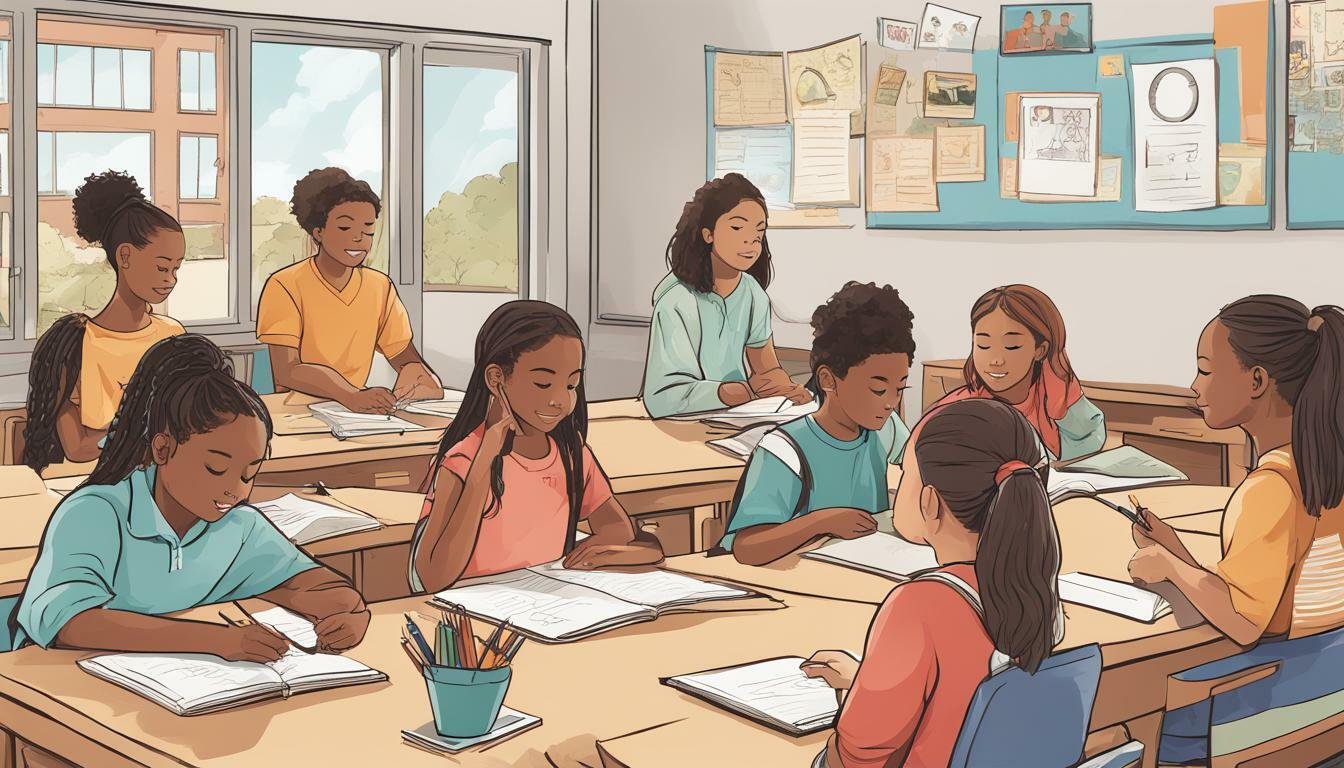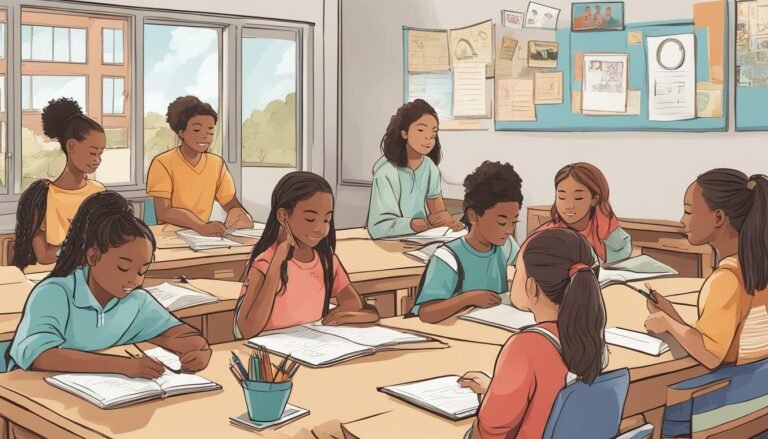
Self-awareness is a crucial part of personal growth and social skills. It allows students to recognize their emotions and reactions, leading to better decision-making and healthier relationships. Encouraging self-awareness in students early on can positively impact their future successes.
In this section, we will discuss the importance of self-awareness for students and explore different activities that can promote self-awareness. We will also provide some advice on how teachers and parents can help students develop this essential skill.
Key Takeaways
- Self-awareness is crucial for students’ personal and social development.
- Engaging in activities that promote self-awareness can help students understand their emotions and reactions better.
- Teachers and parents can play a significant role in encouraging self-awareness in students through various strategies and techniques.
Understanding Self Awareness
Self-awareness involves recognizing and understanding your emotions, thoughts, and behaviors. It is important for personal development, as it enables individuals to identify their strengths and weaknesses and make positive changes in their lives. For students, self-awareness can help improve their academic performance, enhance their social skills, and promote mental health.
There are various exercises and worksheets that students can use to enhance their understanding of themselves and their emotions. For example, journaling can be a powerful tool for self-reflection and self-discovery. By writing down their thoughts and feelings, students can identify patterns in their behaviors and gain a deeper understanding of their emotions.
In addition, mindfulness practices such as meditation and breathing exercises can help students become more aware of their thoughts and emotions in the present moment. These practices can also promote relaxation and reduce stress and anxiety.
Self Awareness Exercises for Students
Here are some self-awareness exercises that students can use to improve their understanding of themselves:
- Reflect on past experiences and identify what you learned from them.
- Ask for feedback from teachers, parents, or peers and use it to improve your behavior and performance.
- Identify your personal values and use them as a guide for decision-making.
- Practice empathy by putting yourself in someone else’s shoes and considering their perspective.
- Identify your triggers for stress or anxiety and develop coping mechanisms to manage them.
Promoting Self Awareness in Students
Self-awareness is a crucial skill for students to develop, as it enables them to understand their emotions, thoughts and how they affect their behavior. Promoting self-awareness in teenagers and high school students can be challenging, but there are specific activities and strategies that educators and parents can implement.
One effective way to promote self-awareness is to encourage journaling. Journaling enables students to reflect on their thoughts, feelings, and experiences. Students can write about their daily routines, their accomplishments, their challenges, and how they feel about them. Journaling helps students identify their strengths and weaknesses, enabling them to find ways to improve and grow.
| Activity | Description |
|---|---|
| Self-Reflection Questions | Teachers can provide a list of thought-provoking questions that encourage students to reflect on their actions, behavior, and emotions. For example, “What was your biggest accomplishment today?” or “How did you handle a difficult situation today? |
| Body Awareness Exercises | Body awareness exercises such as yoga or meditation can help students connect with their bodies and become aware of their physical sensations. These exercises also help reduce stress and anxiety. |
| Group Discussions | Group discussions enable students to share their experiences and perspectives with one another. Teachers can guide the discussion by asking open-ended questions that encourage students to think critically and reflect on their experiences. |
Another effective strategy is to teach students how to give and receive feedback. Teachers can provide guidelines for constructive feedback, emphasizing the importance of being specific, timely, and actionable. This enables students to understand how their behavior affects others and how they can improve their interpersonal skills.
Overall, promoting self-awareness in students requires a combination of activities, exercises, and strategies. By encouraging journaling, body awareness exercises, group discussions, and feedback, educators and parents can help students become more self-reflective, empathetic, and confident individuals.
Engaging Self Awareness Games
Interactive games are an effective way to teach self-awareness to students while keeping them engaged and entertained. These games can be incorporated into classroom activities or extracurricular events. Here are some self-awareness games that students will enjoy:
| Name of Game | Description |
|---|---|
| Emotion Charades | This game is a twist on the classic game of charades. Students act out emotions instead of words, and the rest of the class guesses the emotion. This game encourages students to recognize and express their emotions. |
| Self-Reflection Jenga | Write thought-provoking questions on each block of a Jenga set. Students take turns answering the question that they pull. This game encourages introspection and self-reflection. |
| Self-Awareness Bingo | Create bingo cards with different emotions or traits in each box. Students mark off the boxes that apply to themselves. This game encourages students to recognize and accept their unique qualities. |
Playing these games will enhance students’ self-awareness, interpersonal skills, and emotional intelligence. They will learn to express their emotions, identify their strengths and weaknesses, and appreciate their individuality. Incorporating these games into the classroom will make self-awareness fun and exciting for students.
Promoting Self Awareness in Students
As a teacher or parent, you play a crucial role in promoting self-awareness in students. By encouraging them to reflect on their thoughts, feelings, and actions, you can help them develop a deeper understanding of themselves and their emotions. Here are some effective activities and strategies that you can implement to promote self-awareness in teenagers and high school students:
1. Journaling
Journaling is an excellent way for students to express their thoughts and feelings in a safe and private space. Encourage them to write freely without worrying about grammar or spelling. You can also provide prompts or questions to guide their reflection.
2. Mindfulness Exercises
Mindfulness exercises such as meditation, deep breathing, and body scans can help students become more aware of their thoughts and emotions. Encourage them to practice these exercises regularly to develop a mindfulness habit.
3. Strengths Assessments
Help students identify their strengths and weaknesses by providing them with a strengths assessment tool. This will enable them to develop a better understanding of their unique talents and abilities.
4. Group Discussions
Organize group discussions to encourage students to share their experiences and perspectives. This will enable them to gain insight into others’ thoughts and feelings, enhancing their empathy and social skills.
By implementing these activities and strategies, you can create a supportive environment that fosters self-awareness and personal growth. They enable students to develop a deeper understanding of themselves, enhancing their confidence and interpersonal skills.
Conclusion
Self-awareness is a crucial component of students’ personal and social growth. It allows them to understand and regulate their emotions, build healthy relationships, and set goals for themselves. By engaging in activities and exercises that promote self-awareness, students can learn more about themselves and develop important life skills that will benefit them in the long run.
From self-awareness lesson plans to interactive games and activities, there are various ways teachers and parents can help students foster a deeper understanding of themselves. By providing these resources, educators can create a structured learning experience that encourages personal growth and development.
As we move forward, it is essential that we continue to prioritize self-awareness in education. By doing so, we can help students unlock their full potential and become more confident, empathetic, and self-reflective individuals.
FAQ
Q: What is self-awareness?
A: Self-awareness is the ability to recognize and understand one’s own emotions, thoughts, and behaviors. It involves being conscious of oneself and having a clear understanding of one’s strengths, weaknesses, and values.
Q: Why is self-awareness important for students?
A: Self-awareness is important for students as it helps them develop a better understanding of themselves, their emotions, and their reactions to different situations. It allows them to make informed decisions, manage their emotions effectively, and develop their personal and social skills.
Q: How can activities promote self-awareness in students?
A: Engaging in activities that promote self-awareness can help students explore their emotions, identify their strengths and weaknesses, and reflect on their actions. These activities encourage self-reflection, empathy, and a deeper understanding of oneself and others.
Q: What are some self-awareness activities for teenagers?
A: Some self-awareness activities for teenagers include journaling, mindfulness exercises, group discussions, and self-reflection exercises. These activities encourage teenagers to become more self-reflective, explore their emotions, and develop a greater understanding of themselves and their relationships.
Q: How can self-awareness games benefit students?
A: Self-awareness games can benefit students by providing a fun and interactive way to enhance their self-awareness and interpersonal skills. These games encourage self-reflection, communication, and emotional intelligence, while also fostering a sense of connection and empathy among students.
Q: Are there any self-awareness lesson plans available for educators?
A: Yes, there are comprehensive self-awareness lesson plans available for educators. These lesson plans cover various aspects of self-awareness, including emotions, values, strengths, and goal-setting. They provide structured activities and exercises that help students develop their self-awareness skills.
- Self Harm Awareness Ribbon Color: Unveiling Its Meaning - August 21, 2023
- What Is Emotional Self Awareness: A Guide to Inner Growth - August 21, 2023
- Self Harm Awareness Bracelets: Show Support and Share Hope - August 21, 2023

